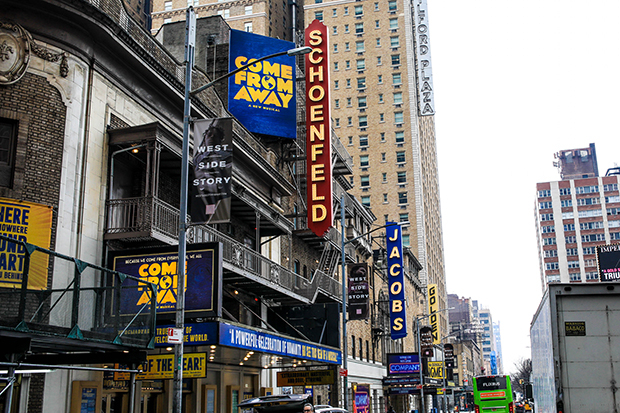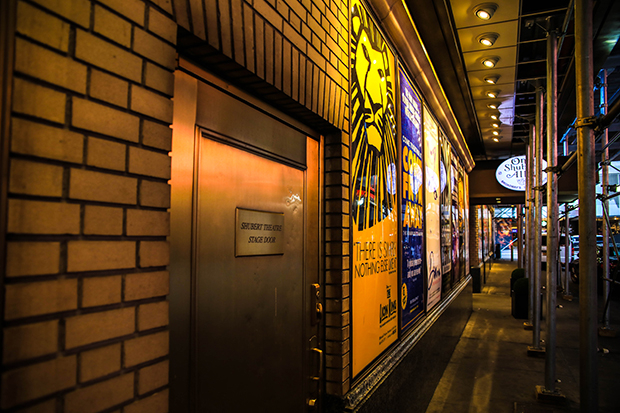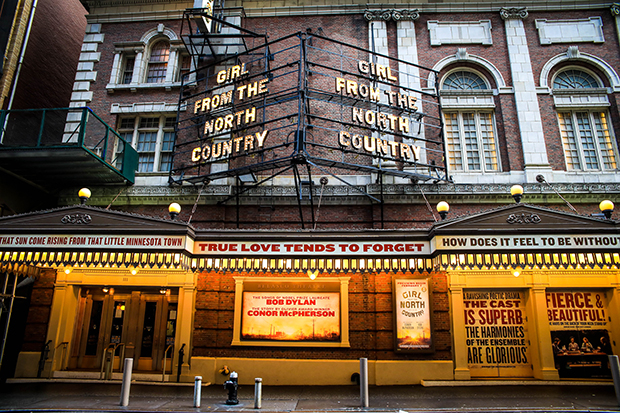An Oral History of the Broadway Shutdown, Part 1
The theater community remembers the extraordinary period between January and March 2020, as the industry and world came to a screeching halt.
Business was booming. Nearly 15 million people had seen Broadway shows during the 2018-19 season. The total box office gross was $1.8 billion. And as the calendar pages flipped to January 2020, every theater had been booked for what was expected to be a prosperous spring, with 21 productions scheduled to open between the first of the year and the late-April Tony Awards cut-off.
By Friday, March 13, that was all moot. The curtain had unceremoniously fallen the afternoon before by order of New York State, as cases of the novel coronavirus ravaged the city and rapidly filled hospitals beyond capacity. There were hundreds of different ways to have seen this eventuality coming — audiences began to thin, whole companies and other theater personnel were getting sick — but Broadway lives by one motto: The show must go on.
The September 11 terrorist attacks kept Broadway closed for a few days. Labor strikes had darkened theaters in the past, but they were generally resolved within weeks. Covid-19 has caused the longest shutdown in the history of the Broadway industry, and while there are glimmers of hope on the horizon in the form of a vaccine, there is still no definitive end in sight.
As we hit the summer of 2020, I started documenting stories from across the Broadway community in an effort to make sense of it all. This is the first in a multi-part oral history of the Broadway industry shutdown, as told by the artists making theater eight times a week. These conversations have been lightly edited for clarity and nothing else, but they all paint a picture that could be a metaphor for the world itself: we were all blissfully naive to impending disaster, until.
Read each part here as they become available every Monday.

In This Section:
Camille A. Brown, choreographer of Aida workshop
Kelly Devine, choreographer of Diana: A True Musical Story and Come From Away
Crystal A. Dickinson, actor in Gnit at Theatre for a New Audience
Brandon Dirden, actor in Take Me Out and director of Radio Golf at Two River Theater
Patsy Ferran, actor in Who's Afraid of Virginia Woolf?
Gaby French, actor in Hangmen
Sue Frost, producer of Come From Away
Erika Henningsen, actor in Flying Over Sunset
Marc Kudisch, actor in Girl From the North Country
Lorin Latarro, choreographer of Mrs. Doubtfire and The Visitor
Tom Kitt, composer of Flying Over Sunset and The Visitor
Des McAnuff, director of Jersey Boys and Ain't Too Proud
Rory O'Malley, actor in Hamilton in Los Angeles
Lauren Patten, actor in Jagged Little Pill
Samantha Pauly, actor in Six
Jessica Phillips, actor in Dear Evan Hansen
Kyle Selig, actor in Mean Girls
Sharon Wheatley, actor in Come From Away
Tony Yazbeck, actor in Flying Over Sunset

INTRODUCTION
Des McAnuff: During the bubonic plague, the theaters had to shut down for long stretches at a time, sometimes even whole seasons, and the King's Men often had to escape the country or go on tour because everyone was dying in the streets in London. I've always fantasized about the plague. I didn't know that I'd actually experience it.
Lorin Latarro: My husband is a neurosurgeon at Mt. Sinai. He would come home from work and say that the numbers were starting to grow, and he started to think that they'd call for some version of a shutdown. Being an eternal optimist, I thought it was going to be fine.
Sharon Wheatley: I'm a planner. I could see this coming down the pike. I'm also a single parent, so I have to pay my daughter's tuition and everything. I called our company manager and said, "Hey, Dave, talk to me about the finances of this. What is the plan in terms of…Is there any sort of payment that will happen when we're shut down? Is there insurance? I just need to know so I can start budgeting." And then I laughed and said, "Am I the first person to think of this?" And he said, "You're the only person."
Marc Kudisch: There was already so much out there, information-wise, about many other things. We had just gotten through the [first] impeachment. The coronavirus was really a backstory…until.
Samantha Pauly: I'm a germaphobe. I am very paranoid. But I didn't really understand the gravity of the situation. I don't think any of us did. I think we were so busy getting ready to open Six on March 12 that it just kind of wasn't there.
Lauren Patten: I look back at that time and I just think about how we had no comprehension of how serious this was.
Rory O'Malley: I remember saying to someone that if this were a movie, there would be a day counter at the bottom of the screen.

PART ONE: JANUARY-FEBRUARY, 2020
Marc Kudisch: We had heard there was a workshop in January where everyone got really sick. It was like, "If you know anyone in that workshop, stay away from them, because they all have the flu."
Des McAnuff: We were in rehearsal at the end of January putting a couple of new actors into Ain't Too Proud, and I was alarmed, at that point, that the so-called "leadership" in Washington seemed to be completely comatose. Even the New York leadership seemed to be asleep at the wheel. It's astonishing to me that some theater goon like me could be concerned about this, six weeks before the people that are supposed to be concerned with such matters. Interestingly enough, Broadway didn't shut down during the Spanish flu in 1918. It continued, foolishly, to operate.
Sue Frost: Our Australian company of Come From Away was supposed to be touring to China in May 2020, so we were really keeping an eye on it in January, trying to determine whether we should officially postpone the tour.
Kelly Devine: We were in rehearsals for Diana and they sent [writers] Joe DiPietro and David Bryan and [leading actor] Jeanna De Waal and me to the Broadway Across America trade conference in the Bahamas in February. I had gotten a little nervous watching the news. I asked our company managers to get us masks for the airport. Funnily enough, none of us wore them, because no one else was wearing masks and we felt weird.
Sharon Wheatley: I sent an email at the end of February to Sue Frost, our producer. I said, "Hey, I've been out getting cleaning supplies and stuff, and things are starting to run low. There's a bathroom on stage level that we all use, and it would be nice to get some cleaning products in there." She wrote back, and I remember replying, "I'm sure this is all for nothing." I totally thought it was for something.
Rory O'Malley: We were launching a new Los Angeles company of Hamilton, which was going to be at the Pantages through June 2021. We rehearsed in New York in February. We went there February 17, and there was talk about coronavirus, but you didn't know what it was. It was like, "wash your hands and be mindful of it."
Kyle Selig: We were having conversations like, "Hey, everybody needs to wash their hands a lot more." That was it. We were in the middle of winter. It was cold season. Every time somebody coughed or did anything, it was like, "Do you have it? Do you have it?" It was very McCarthy.
Tom Kitt: Every time someone sneezed, you turned around.
Tony Yazbeck: Everyone was hyperaware of whether anyone was sneezing, or if there was a cough. Our director, James Lapine, was serious — not so serious, but serious enough to say, "If you're sick, stay home."
Crystal A. Dickinson: Artists are sensitive people — not just sensitive to the environment, but to what's going on in the world, because that's the job. We were all being cautious. We were taking it very seriously early on, not in the way of, like, "Oh, pandemic!" but like, "There seems to be a thing out there that might be troublesome, so we should try to do our part to wash our hands and sanitize our spaces."
Marc Kudisch: A new show is an endurance run and a sprint at the same time. You're doing 12-hour days for two months. You're rehearsing during the day, you're doing the show at night, you're barely sleeping, you're exhausted. All you're doing is looking for opening night, and when you open in the spring, all you're doing is looking for the Tonys. The voters are coming in, the press stuff is coming out, you record the album the minute you finish opening. You don't get time off until June. We were extra careful, but the truth is, when you're doing a show and you're in previews, everyone gets sick anyway.

Gaby French: We were in previews for Hangmen and rehearsing during the day. We'd be at the Golden Theatre morning til night. At some point, they came in and told us to start sanitizing our hands more and just be aware of what was happening around us.
Erika Henningsen: Lincoln Center Theater was really great about communicating with us. There were a lot of cleanings, a lot of health code stuff, some meetings that André Bishop, the artistic director, led about how we're going to stay safe and protected. It felt very much like "OK, now we wash our hands more. Now we have alcohol spray backstage everywhere." Prop handoff was more streamlined. They were trying to make sure the props were in fewer hands.
Camille A. Brown: We had the sanitizer out. People were hesitant about hugging each other.
Sharon Wheatley: My hands were bleeding from hand sanitizer.
Brandon Dirden: There was so much testosterone and machismo in the Take Me Out rehearsal room. Not that any of those guys ever led with it, but it was unspoken. We were really late in picking up the clues. We were doing the elbow bumps and Purell, but it just hadn't sunk in. Guys, for the most part — unfortunately, it's a true stereotype, by and large — are not nearly as careful with our own health as we should be, or as considerate of our own safety. So, there was a real sense of calm for a while, until a sense of nervousness started to creep in at the end.
Patsy Ferran: Our rehearsals were joyous. The nature of my part…Honey gets to do a lot of fun scenes, but she also does a lot of watching. I'm not driving the play; I'm just sitting there watching Laurie Metcalf be the most incredible actor I've ever seen in my life. By comparison, the preview period was fraught with anxiety. We didn't know what coronavirus was, we didn't know how much of it was people blowing things out of proportion. It reached a point where we were quite scared and hoping for a temporary pause to re-group. We weren't feeling well anyway, just out of exhaustion from tech and previews. None of us had any of the symptoms, but we were like, "I feel rundown and tired. I think I've got corona." We were all paranoid that we had it.
Erika Henningsen: We spent a lot of hours in tech. Because of that, I think we were a bit more aware of the news that was circulating. We were just kind of sitting and waiting, sitting and waiting.
Jessica Phillips: I saw someone from our company manager's office, and I said, "So what's the conversation right now? Is there any chance that it's going to affect us in a shutdown capacity?" I fully expected, in that moment, for him to say no, but what he said was, "It's a discussion."
Tony Yazbeck: We were so deep into rehearsals for Flying Over Sunset that it was hard for me — not to take it seriously — but to really put my focus on it. Because I just thought, "Well, the show must go on." It always goes on.







